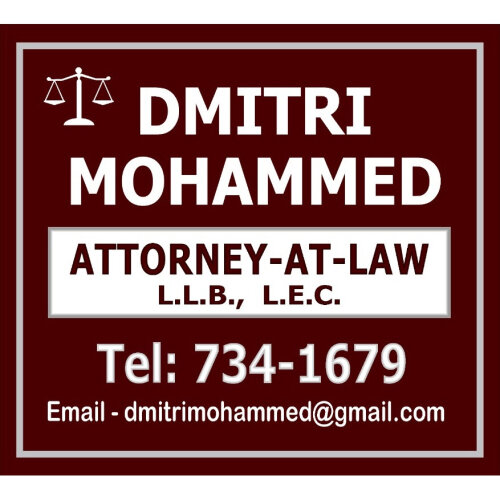Best Will & Testament Lawyers in Trinidad and Tobago
Share your needs with us, get contacted by law firms.
Free. Takes 2 min.
Or refine your search by selecting a city:
List of the best lawyers in Trinidad and Tobago
About Will & Testament Law in Trinidad and Tobago
The creation and execution of a Will and Testament in Trinidad and Tobago are governed by specific laws that aim to ensure an individual's last wishes are honored regarding the distribution of their estate after death. A Will is a legally binding document that details how a person's assets and property should be distributed among beneficiaries. In Trinidad and Tobago, the legal framework surrounding Wills is designed to protect both the testator (the person making the will) and the beneficiaries, ensuring a fair and systematic distribution of assets.
Why You May Need a Lawyer
Creating a Will involves several legal considerations and potential pitfalls. Here are some common situations where legal advice may be necessary:
- Complex Estates: For individuals with a significant number of assets or complex holdings, a lawyer can help in asset distribution planning.
- Blended Families: If there are children from different marriages, a lawyer can provide guidance on ensuring fair treatment for all family members.
- Tax Implications: Legal expertise can help mitigate any potential inheritance or estate taxes.
- Disputed Wills: Lawyers can assist in situations where a Will is contested by potential beneficiaries.
- Legal Compliance: To ensure that the will complies with the local legal requirements and prevents future disputes.
Local Laws Overview
In Trinidad and Tobago, the Wills and Probate Act and the Administration of Estates Act are key legislative frameworks governing the creation and execution of Wills. Here are a few critical aspects:
- Age Requirement: Anyone aged 21 or older can make a will, provided they are of sound mind.
- Legal Formalities: A Will must be written, signed at the end by the testator, and witnessed by at least two individuals present simultaneously.
- Revocation of Wills: A Will can be revoked by creating a new Will or by the testator's expressed intention to revoke it, such as through physical destruction.
- Intestacy Rules: If a person dies without a valid will (intestate), the estate will be distributed according to the rules set out in the Administration of Estates Act.
Frequently Asked Questions
What happens if I die without a Will in Trinidad and Tobago?
If you die without a Will, your estate is distributed according to the intestacy rules under the Administration of Estates Act, which prioritizes spouse, children, and other close relatives.
Can I write my own Will?
Yes, you can write your own Will. However, it's recommended to consult a lawyer to ensure it meets legal requirements and is structured to accurately reflect your wishes.
How often should a Will be updated?
It's wise to review and possibly update your Will after significant life events, such as marriage, the birth of a child, or the acquisition of significant assets.
Do Wills need to be registered in Trinidad and Tobago?
No, Wills do not need to be registered. However, after death, the Will should be probated through the court for the distribution process to begin.
Who can act as a witness to my Will?
A witness should be an independent adult who is not a beneficiary or the spouse of a beneficiary under the Will to avoid any potential conflicts of interest.
What is a codicil?
A codicil is a legal document that allows you to make amendments to an existing Will without having to rewrite the entire document.
What is probate?
Probate is the legal process through which a deceased person's estate is administered and distributed according to their Will.
Can a beneficiary be an executor?
Yes, a beneficiary can also be named as an executor in your Will and handle the estate's administrative tasks.
What are the costs involved in creating a Will?
The costs vary depending on the complexity of the estate and the lawyer's fees. It's best to get an estimate from a legal professional.
What should I do if I want to contest a Will?
If you believe a Will is invalid or unfair, you should seek legal advice promptly to explore your options for contesting it in court.
Additional Resources
There are several resources and organizations in Trinidad and Tobago that can provide assistance and information:
- The Law Association of Trinidad and Tobago: Offers resources and listings for finding legal professionals.
- Ministry of the Attorney General and Legal Affairs: Provides information on probate and estate matters.
- Legal Aid and Advisory Authority: Can assist low-income individuals with legal advice and representation.
Next Steps
If you need to seek legal assistance regarding Wills and Testament issues in Trinidad and Tobago, consider the following steps:
- Contact a qualified attorney specializing in estate planning and probate law to discuss your situation and options.
- Prepare all relevant documents and information about your assets and any current wills or legal documents.
- Schedule a consultation to outline your needs and explore the legal processes ahead.
- Follow your lawyer's advice on drafting, updating, or contesting a Will to ensure it aligns with both your wishes and legal standards.
Lawzana helps you find the best lawyers and law firms in Trinidad and Tobago through a curated and pre-screened list of qualified legal professionals. Our platform offers rankings and detailed profiles of attorneys and law firms, allowing you to compare based on practice areas, including Will & Testament, experience, and client feedback.
Each profile includes a description of the firm's areas of practice, client reviews, team members and partners, year of establishment, spoken languages, office locations, contact information, social media presence, and any published articles or resources. Most firms on our platform speak English and are experienced in both local and international legal matters.
Get a quote from top-rated law firms in Trinidad and Tobago — quickly, securely, and without unnecessary hassle.
Disclaimer:
The information provided on this page is for general informational purposes only and does not constitute legal advice. While we strive to ensure the accuracy and relevance of the content, legal information may change over time, and interpretations of the law can vary. You should always consult with a qualified legal professional for advice specific to your situation.
We disclaim all liability for actions taken or not taken based on the content of this page. If you believe any information is incorrect or outdated, please contact us, and we will review and update it where appropriate.
Browse will & testament law firms by city in Trinidad and Tobago
Refine your search by selecting a city.














